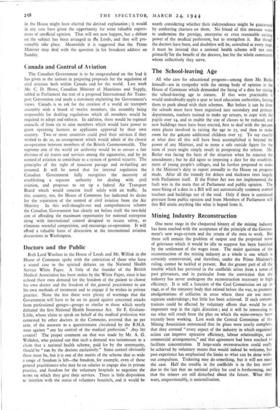Doctors and the Public
Both Lord Woolton in the House of Lords and Mr. Willink in the House of Commons spoke with the conviction of those who have a sound case in the spirited debates on the National Health Service White Paper. A little of the thunder of the British Medical Association has been stolen by the White Paper, since it has echoed their own demand for the freedom of the patient to choose his own doctor and the freedom of the general practitioner to use his own methods of treatment and to engage if he wishes in private practice. None the less there were plenty of warnings that the Government will have to be on its guard against concerted attacks from professional groups—groups so similar to those which nearly defeated the first National Health Insurance Act. Sir E. Graham- Little, whose claim to speak on behalf of the medical profession was contested by other doctors in the Commons, asserted that go per cent. of the answers to a questionnaire circulated by the B.M.A. were against " any lay control of the medical profession." Any lay control! The proper comment on that was made by Mr. A. G. Walkden, who pointed out that such a demand was tantamount to a claim that a national health scheme, paid for by the community, should be " run by the doctors exclusively." Some control obviously there must be, but it is one of the merits of the scheme that so wide a range of freedom is left—the freedom, for example, even of those general practitioners who may be on salaries to engage also in private practice, and freedom for The voluntary hospitals to negotiate the terms on which they give their services. There is little disposition to interfere with the status of voluntary hospitals, and it would be
worth considering whether their independence might be guaranteed by conferring charters on them. No friend of this measure wants to undermine the prestige, enterprise or even reasonable earning power of the medical profession, but to strengthen it. But though the doctors have been, and doubtless will be, consulted at every stage, it must be insisted that a national health scheme will not exist primarily'for the benefit of the doctors, but for the whole community whom collectively they serve.


























 Previous page
Previous page